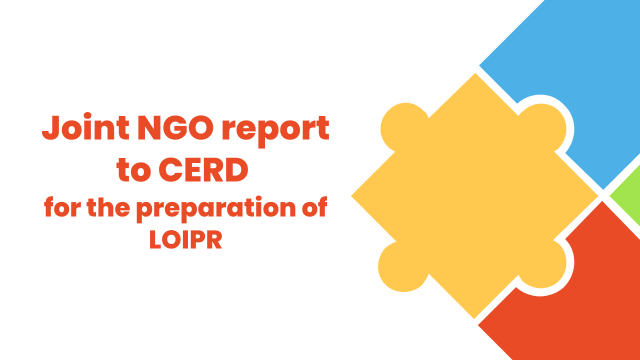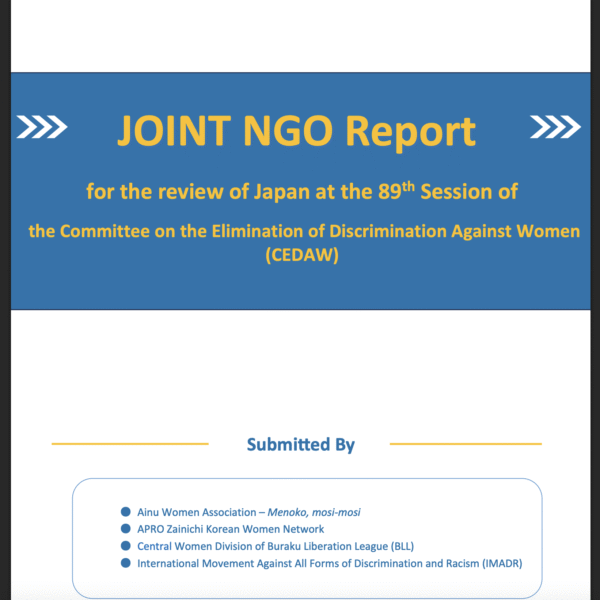 Rights of Minorities /
Rights of Minorities /
Indigenous Peoples

Upholding the Rights of Minorities and Indigenous Peoples
The focus areas of IMADR include upholding the rights of minorities and indigenous peoples. We aim to empower them from the grassroots level to make their voices heard at national, regional and international levels. In particular, we support the participation of minority and indigenous representatives in the Committee on the Elimination of Racial Discrimination (CERD), the Human Rights Council and its relevant bodies. Previously, we closely followed the development of the United Nations Declaration on the Rights of Indigenous People (UNDRIP). UNDRIP was adopted by the General Assembly on 13th September 2007, which spells out a wide range of individual and collective rights including the freedom from discrimination, right to self-determination and free, prior and informed consent.
Roma
Roma is the largest minority group in Europe where they moved from northwest India in the late Middle Ages. While Roma in Europe live in different countries, social environments and cultures, it is common among them that they have historically been persecuted and discriminated against as marginalised communities in Europe. Roma were victims of the Holocaust. Nazis labelled them as the “inferior race” and sent them to concentration camps including Auschwitz. In the course of the Holocaust, a total of 500,000 Roma were killed. The Central Council of German Sinti and Roma, a partner of IMADR, played a core role to have finally made the German government admit its responsibility to the tragedy of Sinti and Roma during the Nazi regime. The stereotyped attitude and prejudice against Roma have deeply rooted in people’s mind, and majority of them live in difficult situations in their respective countries in Europe who are treated unequally and unduly in the areas of education, employment, housing and others. With the increasing influence of neo-Nazi and extremist groups in Europe, Roma are being targeted for persecution and exclusion from society. IMADR takes actions against racist and inhumane policies, measures or incidents against Roma through the advocacy work or protest actions at the international, regional and national levels.
Ainu Indigenous Peoples
Ainu peoples have inhabited the far north island of Japan, Hokkaido, and its surrounding areas for centuries. Since the establishment of the organisation, IMADR has partnered with the Ainu Association of Hokkaido to demand the Government of Japan to protect and promote their indigenous rights. On the occasion of the adoption of UNDRIP, the Government passed “the resolution to recognize the Ainu as indigenous peoples” in both the House of Representatives and the House of Councillors which set up the Experts Advisory Panel. In 2009, with the report of the Panel, the Council for Ainu Policy Promotion was established within the Cabinet Secretariat. However, the Council, which is composed of less than half of Ainu representatives, has a limited scope and focuses on the preservation of Ainu culture and history. Critical questions on the rights of Ainu peoples such as the lower socio-economic status of Ainu, the restoration of the language, the right to land and natural resources remain unaddressed.
Ryukyu/ Okinawa
Okinawa is composed of a group of small islands located in the East China Sea. Before it was forcibly annexed by the Government of Japan in 1879, the islands had been governed by an independent kingdom (Ryukyu Kingdom) since 1429 with distinct culture, diverse religions and languages. The Government implemented assimilation policies in Okinawa which forced the islanders to use the Japanese language and banned to practice religious and other forms of cultural traditions. After the Pacific War, Okinawa came under the US control for 20 years until 1972. During the period, various human rights abuses and the confiscation of the land to build military bases and facilities took place. Although the islands are no longer under the US rule, 74 % of the US military bases are stationed in the islands which consist of only 0.6 % of the land area of Japan. UN anti-racism body (CERD) has consistently recommended the Government to recognize the people of Ryukyu/Okinawa as indigenous peoples and protect their rights, culture and languages. In partnership with the Association of the Indigenous Peoples in the Ryukyus (AIPR), All Okinawa Council for Human Rights (AOCHR) and others, IMADR continuously brings their voices to national, regional and international levels.






